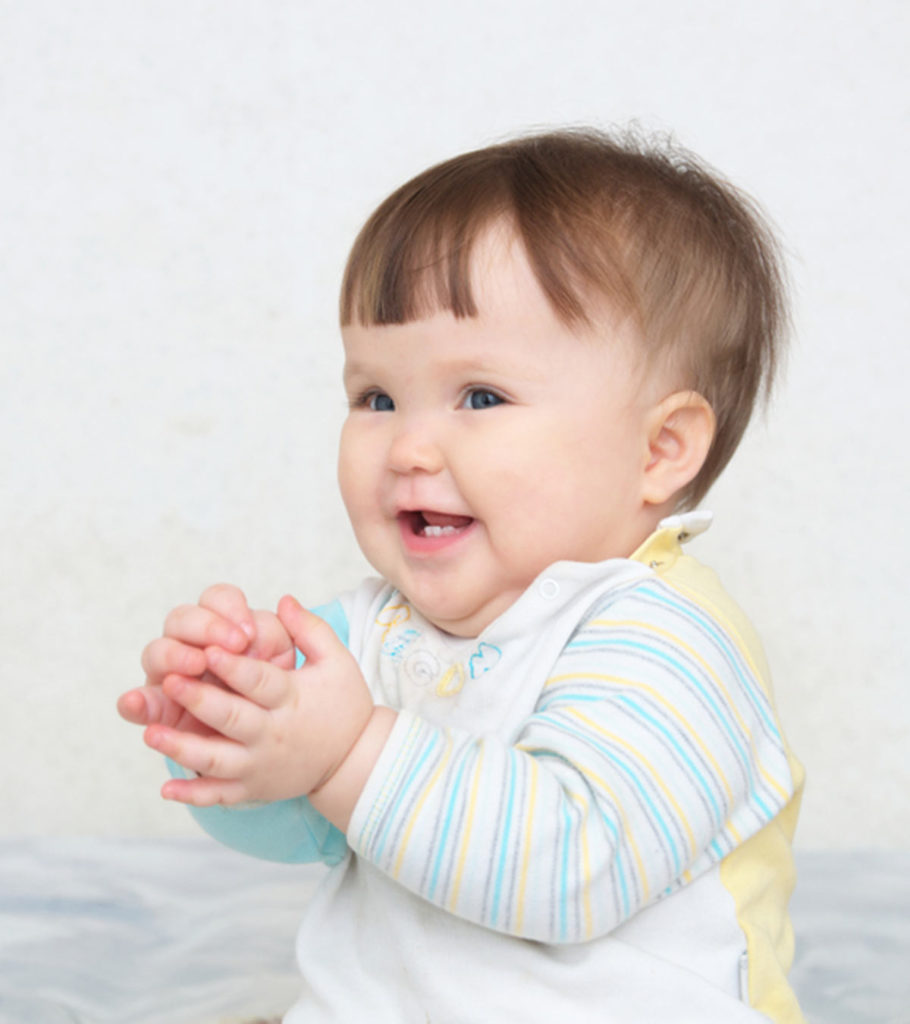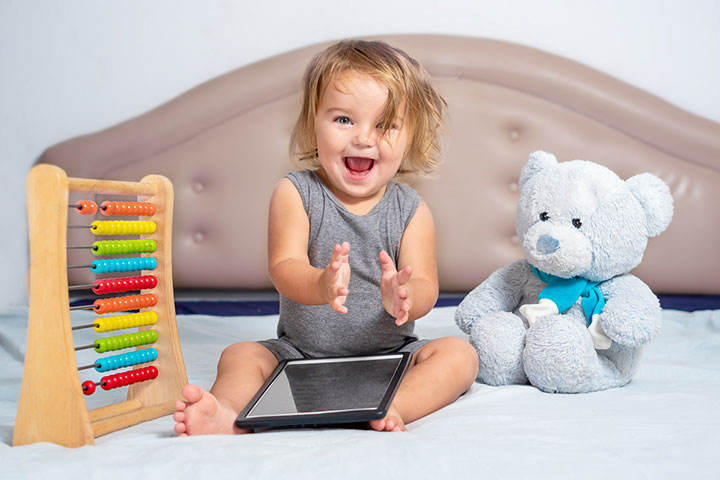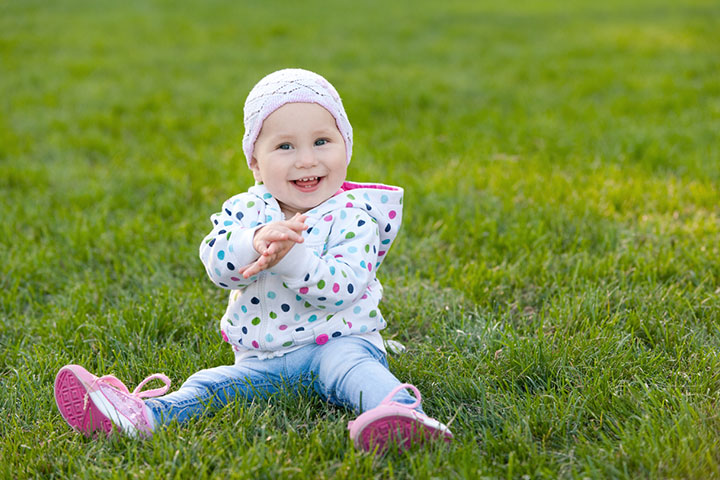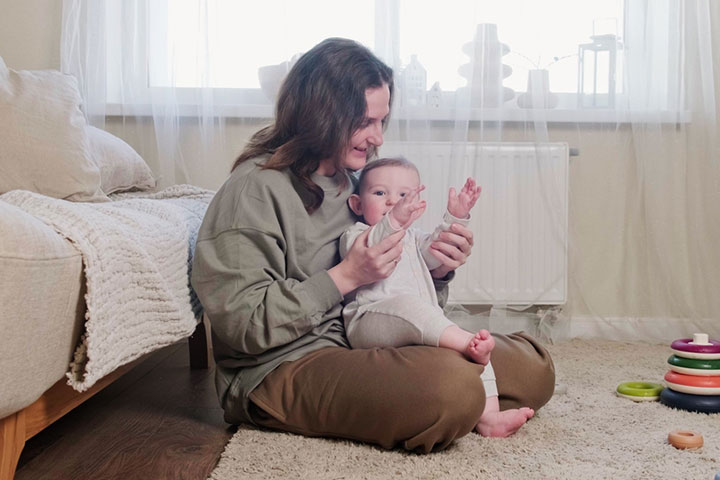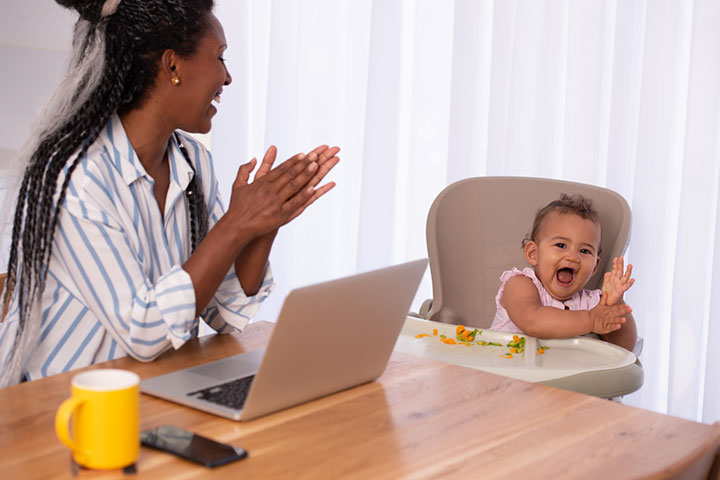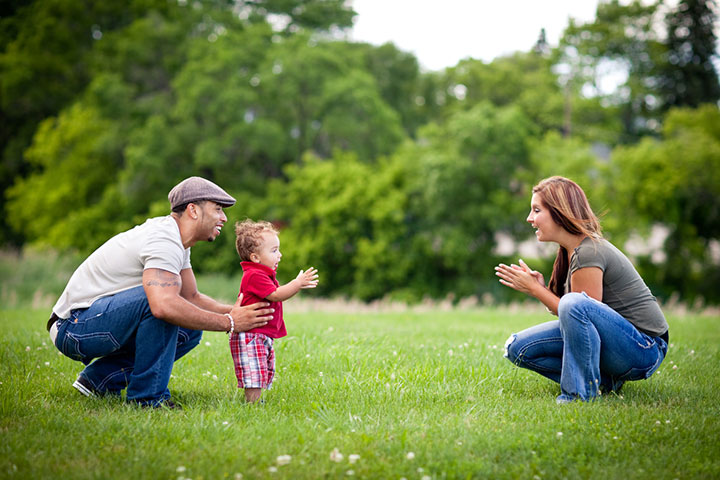Clapping hands is an achievement many parents look forward to in their babies. You may wonder when do babies clap their hands and how you may promote it. Clapping is one of the various infantile developmental milestones, which can be stimulated with the right amount of interaction and encouragement.
Once a baby begins to clap, they may do so for various reasons, including showing affection, delight, glee, enjoyment, and amusement. Claps may also signal that the baby’s motor skills and coordination are developing normally. This post explains all about babies clapping their hands and encouraging them through activities.
When Do Babies Start Clapping?
Babies can usually clap hands from nine months, the age when babies begin to imitate gestures, including hand gestures, made by others (1). It is okay if a nine-month-old does not clap. They may gradually develop the skill and clap by their first birthday.
Why Do Babies Clap Hands?
Babies may clap due to reasons related to their physical and cognitive development milestones. The following are some of the likely reasons why babies clap hands.
1. Development of motor skills
The first year of a baby’s life involves several growth and development milestones that include skills related to hand movement (2). Picking and holding objects, passing objects from one hand to another, and waving and pointing with hands are some of the key achievements during this phase (3). Clapping hands is part of the natural progression of a baby’s gross and fine motor skills.
2. Perception of achievement
We often clap our hands to encourage the baby when they do certain activities. Babies are keen observers and can understand cause and effect through repeated observation. The little one may eventually realize that clapping hands is a form of reward for achievement or celebration. Therefore, babies may clap their hands out of cheerfulness when they feel they have achieved something or feel excited after doing something.
3. Means of communication
Clapping is a baby’s way of communication. Initially, they clap their hands to imitate their caregivers, but as they grow older, they associate clapping to express their feelings and convey their messages. Babies may clap hands in front of parents or caregivers to gain attention, express their jubilation or exuberance, or even answer questions.
4. Attempt of experimentation
Babies discover the world and even parts of their bodies through experimentation. A baby may act to see the reaction it elicits from parents/caretakers or the sensation and noise it induces. Clapping hands could be a baby’s way of figuring out what happens if both hands meet. Some babies may get fascinated with the sensation of the hands touching each other and find it entertaining.
Which Skills Are Associated With Clapping Hands?
Clapping hands is associated with working memory, inhibition, and cognitive flexibility (5). It is the foundation of developing fine motor skills, hence a developmental milestone in babies. For instance, listening to rhymes can help them understand the rhythm that makes them excited and engaged, promoting clapping.
Activities To Encourage Your Babies To Clap Hands
Your babies tend to copy you, so they will try to do the activities you repeat in front of them. You may try the following activities to encourage your baby to clap.
1. Playing games
Playing is always fun and more exciting when there is a combination of songs with activities. This will develop the verbal skills, fine motor skills, and cognitive skills of your baby.
You can play and amuse them with the following games.
- Pat-A-Cake, Pat-A-Cake, Baker’s Man
- Little Piggy
- A Sailor Went To Sea
- Down Down Baby
- Miss Susie
- Pretty Little Dutch Girl
- Pease Porridge Hot
- If You’re Happy And You Know It
- Hokey Pokey
- Miss Mary Mack
2. Clapping combined with rhymes
Take your baby’s hands in your hands and gently show them the motion of clapping. Do it slowly. Laugh and appreciate them when the hands join to clap.
Play any nursery rhyme or any song you like to set the demonstration in rhythm for your baby. Repetition of this activity will help the baby understand the gesture better.
3. Clapping with different speeds
Babies like unexpected events and varieties. Providing variation in clapping speeds will help to get their attention and develop their interest.
4. Giving high fives
It will teach your baby that slapping palms together has meaning. Babies are delighted and will smile when you “high-five” them frequently.
5. Applauding
Applaud your baby for their little achievements, like when they get building blocks in shape, join the puzzle parts correctly, or pick the right things when told. You can also clap and cheer for your baby when they finish their meals or feedings.
What If The Baby Isn’t Clapping?
A baby may achieve developmental milestones at a slightly different age than his/her peers. Also, there could be variations in abilities across babies of the same age. Therefore, do not panic if your baby does not clap. They might gradually pick up clapping by 12 months of age.
If your one-year-old does not imitate clapping or other gestures, does not point to things, or seems to lose skills gradually, then speak to a pediatrician. The doctor will assess various developmental milestones of the baby to determine any delays.
Milestones To Expect After The Baby Learns To Clap
After your baby masters the art of clapping, there are several milestones that follow by the age of 18 months (4).
- Standing up without support
- Start taking their first steps
- Say their first words, such as “Mama” and “Dada”
- Follow your simple directions, like “find the ball” or “point your nose”
- Shake their heads to answer your questions in “yes” or “no”
What Other Hand Movement Milestones Will The Baby Achieve?
A baby achieves several hand motion milestones as they grow. By nine months, they can pull food towards themselves apart from clapping. When they reach their first birthday, they can pick items between their index finger and thumb. By 15 months, they may be able to feed themselves with their fingers (6).
However, some babies may achieve these milestones earlier or later than others. If your baby did not reach a particular milestone during the specified age bracket, do not worry. They may learn it later. You may talk to their pediatrician about their general developments.
Though many babies start clapping at nine months, some parents might wonder when do babies clap. Many parents associate clapping as a milestone since it may signal physical and cognitive development. Clapping also signifies the development of the baby’s gross and fine motor skills. You could encourage your little one by introducing them to clapping games or by clapping to nursery rhymes. However, consult your pediatrician if your baby does not clap, point to objects, or show any gestures at one year.
Key Pointers
- Babies usually learn to clap when they are nine months old.
- A baby’s attempt to clap indicates developing motor and communication skills.
- Activities such as clapping at various speeds or clapping with music could encourage the development of this milestone.
- Don’t panic if your infant cannot clap yet; each baby develops at their own pace.
- Consult a pediatrician if a baby of more than one year doesn’t attempt to clap or doesn’t point at things.
